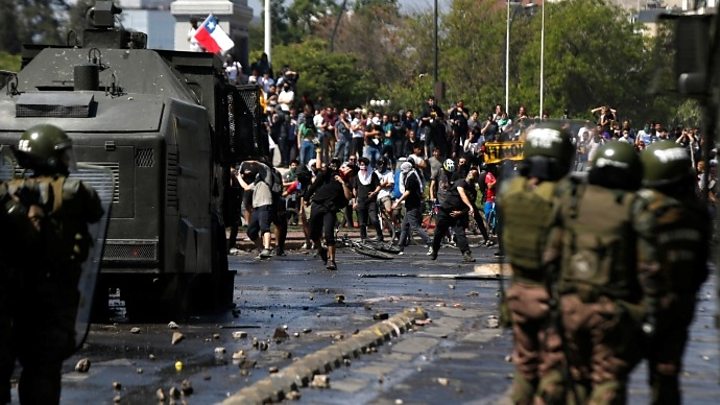Protesters fired buses and factories in reaction of fare hikes of metro
Five people have died after a garment factory was set ablaze by looters near Chile’s capital Santiago amid a wave of violent protests.
The military and police used tear gas and water cannon against protesters and a curfew was imposed in major cities.
A state of emergency already in place in Santiago is to be extended to cities in the country’s north and south.
The unrest, sparked by a now suspended metro fare hike, has widened to reflect anger over living costs and inequality.
In a late-night statement on television, President Sebastián Piñera said: “We’re at war against a powerful enemy, who is willing to use violence without any limits”.
Current situation of protest?
In several cities on Sunday, protesters set more buses on fire, smashed up metro stations and clashed with riot police. A night-time curfew was imposed in the areas of Santiago, Valparaíso, Coquimbo and Biobío.
Meanwhile, a state of emergency will be applied to Antofagasta, Valparaíso, Valdivia, Chillán, Talca, Temuco and Punta Arenas, allowing authorities to restrict people’s freedom of movement and their right to assembly.
Speaking to journalists, Interior Minister Andrés Chadwick said there had been 70 “serious incidents of violence”, including 40 lootings of supermarkets and other businesses.
“We’re facing a real escalation that is undoubtedly organised to cause serious damage to our country and the lives of each of its citizens,” he said.
Some 10,500 police and soldiers had been deployed to the streets, he said, and at least seven people had died in incidents related to the protests, without giving details.
Firefighters said they found five bodies inside a factory burned by rioters in a suburb of Santiago.
More than 1,400 people were detained across the country, officials said, while two people suffered gunshot wounds after a clash with police.
In Santiago, shops remained closed, almost all public transport was suspended and some flights at the international airport were cancelled or rescheduled because of insufficient crew.
At least one line of the city’s metro was expected to reopen on Monday after the entire system was closed on Friday because of the damage caused during the unrest, the worst to hit one of Latin America’s most stable countries in decades.
What is the reaction of President?
A billionaire conservative, Mr Piñera has been criticised for his response to the protests, the most severe crisis of his current term.
He said people who were causing fires, setting up barricades and looting were “criminals”.
“We’re very aware that [those behind the riots] have a degree of organization, logistics, typical of a criminal organization,” he said. “I call on all my compatriots to unite in this battle against violence and delinquency.”
Mr Piñera – who took office in March 2018 after having served as president between 2010 and 2014 – has deployed soldiers and tanks for the first time since 1990, when Chile returned to democracy after the dictatorship of Augusto Pinochet.
History of unrest?
The unrest has exposed divisions in the nation, one of the region’s wealthiest but also one of its most unequal, and intensified calls for economic reforms.
Protester Constanza Gonzalez told the BBC: “This isn’t about political parties. I think people are angry and this was a thing that had been coming for quite a long time.”
Mr Piñera suspended the rise in the Santiago metro fare on Saturday, saying he had listened “with humility” to “the voice of my compatriots”.
